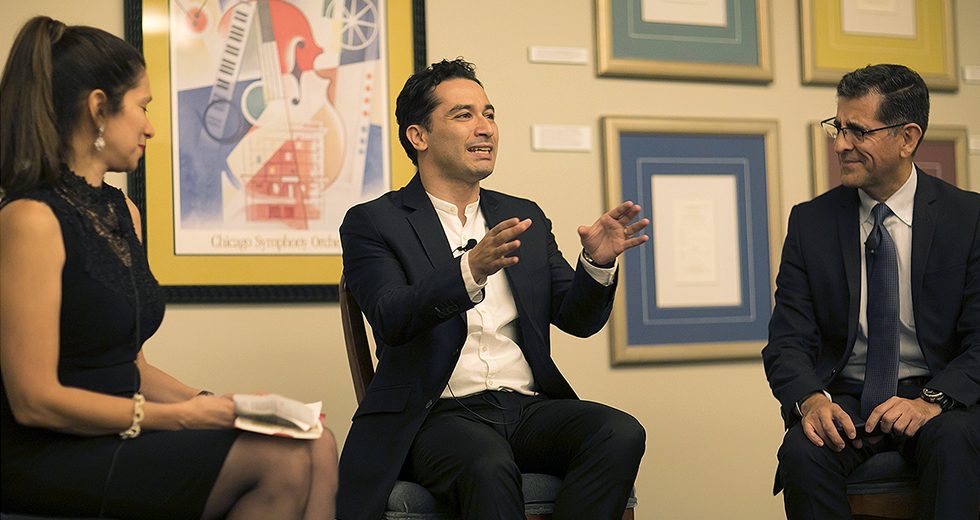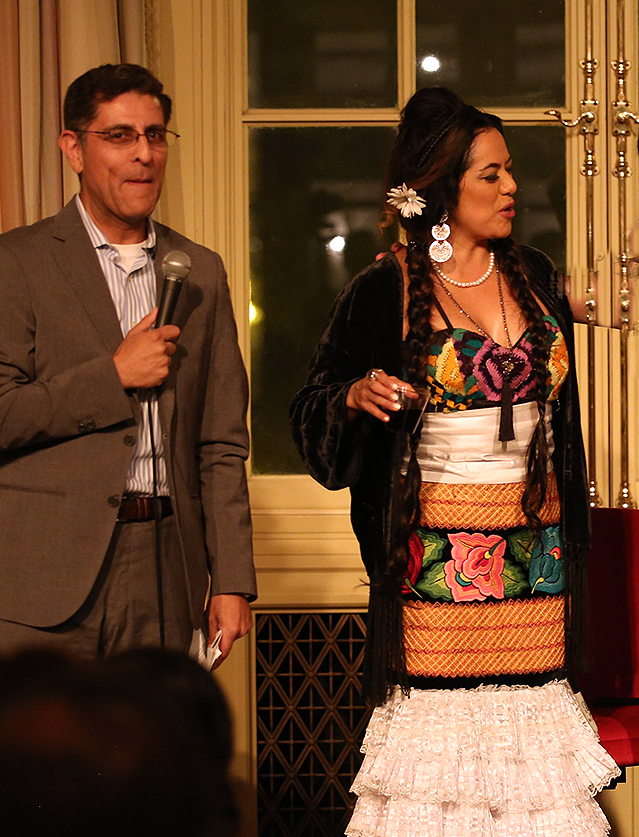
For the classical music world, it could be the ultimate unanswered question: Where are the audiences of the future?
The Chicago Symphony Orchestra has found the solution right in its own backyard. To that end, it launched the CSO Latino Alliance, dedicated to “creating awareness, sharing insights, and building relationships among the Chicago area’s diverse communities.” As part of its mission, the Alliance hosts concerts, receptions, and educational events throughout the year. Membership is free and open to the public. The next Latino Alliance event is Sept. 26, with a pre-concert reception, followed by a CSO performance, led by Riccardo Muti and featuring violinist Anne-Sophie Mutter, and then a post-concert Q&A session with Maestro Muti.
Since its start in January 2013, the Latino Alliance has grown to an active membership of more than 250 individuals. Its eight-member advisory board, which meets monthly, is co-chaired by Ramiro J. Atristaín-Carrión and Loida Rosario.

Singer-songwriter Lila Downs (with Ramiro J. Atristaín-Carrión) appears at a post-concert session presented by the CSO Latino Alliance. | ©Todd Rosenberg Photography 2016
Both Atristaín-Carrión and Rosario, who have been active in non-profit circles for many years, are passionately committed to the cause of the CSO Latino Alliance. “As U.S. population evolves, it’s important to attract a younger market that is inclusive of a larger national demographic,” said Atristaín-Carrión, managing director of the Chicago-based investment firm Atristaín Financial Advisors. “It’s important that the CSO makes an effort to involve and engage this audience. Besides, the culture of music transcends ethnicity, so what not foster that idea and engage more people?”
“The number of Latinos in the Chicago area continues to grow, and Latinos in general love music and the arts,” said Rosario, a strategy business adviser. “So connecting the two makes sense.”
Their observations are backed by research conducted by the League of American Orchestras. A recent League survey determined that Latino attendance at classical music events nationwide is expected to nearly double by 2018, largely due to population growth but also as the result of Latinos’ expanding economic clout and increased interest in the art form. At Symphony Center, Latino attendance has already surpassed that predicted trend, with the percentage of Hispanic ticket buyers growing from 3 percent in 2013 to 6 percent in 2016.
For Alliance members, however, more important than mere numbers is sharing the experience of one of the world’s greatest cultural institutions. “We want more people to hear music in all its glory, in live performance,” Rosario said. “That feeling is something that everyone can enjoy. Classical music is the heritage of all of us, and it’s our duty to make it our own.”
“Music is a universal language,” she added. “Many Latinos grew up listening to the classics Beethoven, Mozart, Bach and cherishing those like Manuel de Falla, one of the most acclaimed composers of the 20th century. The new cadre of musicians and music conductors such as Andrés Orozco-Estrada from Colombia, now with the Houston Symphony, Venezuela’s Gustavo Dudamel, now with the Los Angeles Philharmonic, and Mexican-American Alondra de la Parra are shattering preconceptions about classical music audiences. They are bringing a level of energy with rigor and also innovation to the world of classical music that engages everyone.”
Through the Latino Alliance, Atristaín-Carrión and Rosario also hope to raise the CSO’s profile in underserved communities. “Sometimes people in the Chicago area take the CSO for granted,” said Atristaín-Carrión, who travels frequently to Europe and Mexico. “Everywhere I go abroad, people know the reputation of the CSO, and it’s gratifying to hear of its success. In the case of the CSO, we have a tremendous treasure right here in our backyard, but we haven’t always made the connection to certain demographic groups.”
Both Atristaín-Carrión and Rosario came to classical music as listeners. “I was exposed to classical music while growing up, so it’s in my DNA,” Atristaín-Carrión said. Rosario first visited Orchestra Hall when her children would perform there with their student ensembles. “A lot of Latinos first get interested in music through their families,” she said. Recalling that one of her older cousins, a medical student, used to study with classical music in the background, she added, “That’s an image that stayed with me for years. Classical music expands your brain and soul. It’s a great experience to be shared with others.”
As for sharing, one of the Latino Alliance’s most popular offerings is its annual Noche Navideña event, tied to traditional Latino yuletide celebrations. At all Latino Alliance events, the program features a preconcert reception (often with CSO musicians and guest artists from that evening’s concert), networking, refreshments, and occasionally, live performances. Past participants have included conductors Carlos Miguel Prieto and Andrés Orozco-Estrada, and artists Lila Downs, Javier Perianes and Yo-Yo Ma.
Other Latino Alliance events scheduled for this season are Noche Navideña, Friday, Dec. 15 (the CSO’s holiday revue “Merry, Merry Chicago”); Thursday, Jan. 18 (Rafael Payare conducting works by Bernstein, Mozart and Bartók), and Thursday, March 22 (Muti conducting Schubert’s Mass in E-Flat Major). Tickets are available at a discounted rate of $35 each. For more information or to join the Alliance, go to www.cso.org/welcome, or visit the group’s Facebook page.
TOP: Latino Alliance co-chairs Loida Rosario and Ramiro J. Atristaín-Carrión interview conductor Andres Orozco-Estrada. | ©Todd Rosenberg Photography 2016